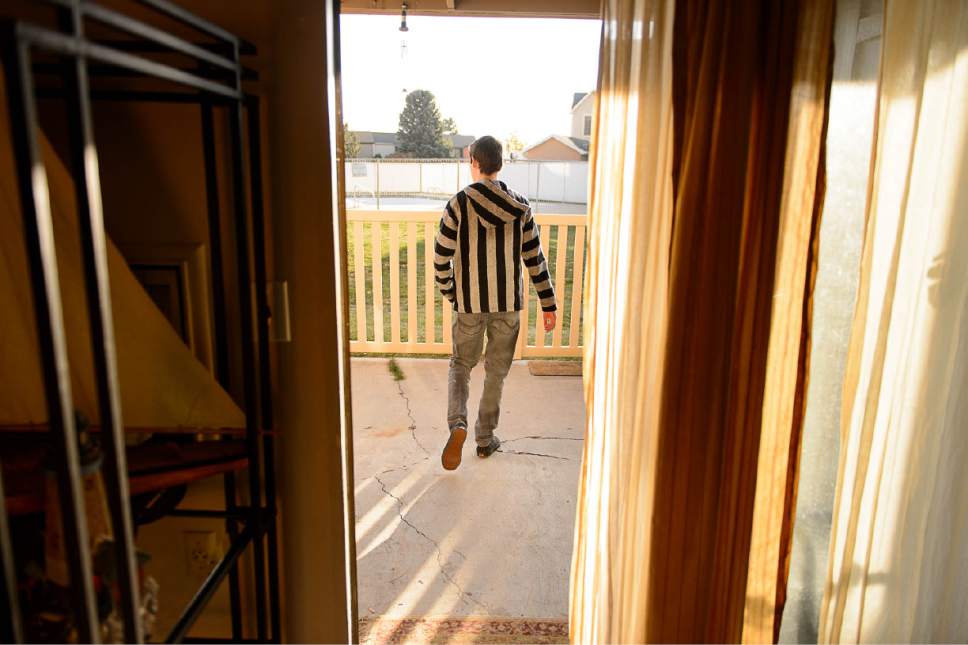This is an archived article that was published on sltrib.com in 2017, and information in the article may be outdated. It is provided only for personal research purposes and may not be reprinted.
Cooper Van Huizen, who was prosecuted as an adult when he was 16 and pleaded guilty to felony charges, has a chance to wipe the slate clean.
The Utah Court of Appeals on Thursday vacated a 2013 order binding Van Huizen over to stand trial as an adult in 2nd District Court. The 3-0 decision sends the case back to juvenile court for a new bindover hearing.
If a judge orders that the case be tried in adult court, Van Huizen's convictions for two second-degree felony robbery counts will stand, the Court of Appeals decision says. If the judge decides that the matter should not be bound over to adult court, the convictions will be thrown out.
Van Huizen, now 19, served six months of a 1- to-15-year prison sentence and was paroled in late 2014.
The Court of Appeals concluded Van Huizen is entitled to the new hearing because the juvenile court judge assigned to his case was married to the then-chief criminal deputy in the Weber County Attorney's Office, the agency prosecuting the matter. Because the judge did not disclose the relationship, Van Huizen's lawyers did not have the opportunity to request her disqualification, the decision says.
Writing for the court, Judge Stephen Roth said, "We note at the outset that our thorough review of the record gives us no reason to think the Juvenile Judge was actually biased against Van Huizen. However, as we discussed above, the Code of Judicial Conduct requires a judge's disqualification under many circumstances that fall short of actual bias, such as situations where a reasonable person would question the judge's impartiality."
The decision was joined by Judge Frederic Voros Jr. and Judge Russell Bench.
According to court documents, Van Huizen committed a home invasion robbery in Roy on Nov. 19, 2013, with a friend and some acquaintances. At 16, the South Ogden teen was the youngest in the group; his friend also was a juvenile and the other three were adults.
Two people were held at gunpoint as the robbers demanded money, cell phones and a stash of marijuana. Van Huizen did not orchestrate the robbery but agreed to it and provided guns from his family home, court documents say.
Van Huizen was charged with two counts of aggravated robbery and one count of aggravated burglary under the Serious Youth Offender Act, which required the state to file a criminal information in juvenile court against minors accused of certain serious felony offenses so a judge could determine whether they should be tried as an adult or remain in juvenile court.
Prosecutors had to first establish probable cause Van Huizen committed the crimes, all of them first-degree felonies with a maximum penalty of up to life in prison. Then, to keep the case in juvenile court once probable cause was proven, the defense had to establish "it would be contrary to the best interest of the minor and the best interests of the public to bind the defendant over."
Juvenile court Judge Michelle Heward decided defense attorneys had shown Van Huizen's best interest was served by remaining in juvenile court, but they had not shown that the public interest also favored retention.
The case went to adult court, where the same deputy county attorney who handled the juvenile proceedings continued to prosecute Van Huizen. The prosecutor received at least some assistance from the juvenile judge's husband — who, as chief criminal deputy was within the chain of command for the case — in the adult district court proceedings, the appeals court decision says.
Van Huizen eventually pleaded guilty to the reduced second-degree felony robbery counts. The teen thought he would receive a punishment similar to two co-defendants, one of whom was sentenced to 180 days in jail and the other to 120 days.
However, 2nd District Judge Ernie Jones said the 180 days in jail recommended by attorneys and Adult Probation and Parole was "too soft" for his crimes and imposed two concurrent sentences of 1- to 15 years in prison on May 7, 2014.
Six months later, on Nov. 4, 2014, just hours after Van Huizen's first parole hearing, the Utah Board of Pardons and Parole ordered that he be released the next day. The teen was placed on parole for 36 months.
According to its "rationale for decision" memorandum issued, the parole board found no aggravating factors in Van Huizen's case. But 22 factors were checked as "mitigating factors," including the characteristics of the offense, the offender's traits at the time of his offense, the offender's background and rehabilitative efforts, and the victim's characteristics.
While he was serving his sentence, the teen got a new attorney, Elizabeth Hunt, and appealed the bindover order. Under the Court of Appeals decision, a different juvenile court judge will preside over the new hearing.
The Utah Attorney General's Office is reviewing the ruling, spokesman Dan Burton said.
Van Huizen and Hunt could not be reached for immediate comment. Van Huizen's father, Marc Van Huizen, who had said at the time his son was released in 2014 that he wanted the appeal to continue, declined to comment about the ruling on Monday.
Twitter: @PamelaMansonSLC















